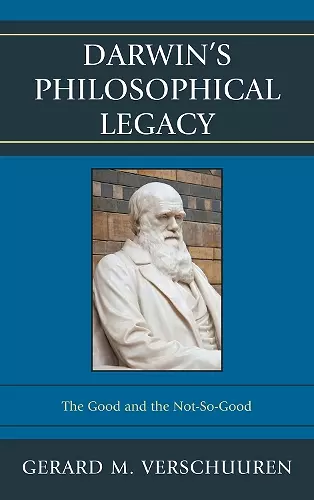Darwin's Philosophical Legacy
The Good and the Not-So-Good
Format:Hardback
Publisher:Lexington Books
Published:18th May '12
Currently unavailable, and unfortunately no date known when it will be back
This hardback is available in another edition too:
- Paperback£41.00(9780739190586)

There is hardly any university, college, or even high school left where they do not teach Darwinism—and rightly so. Yet, most of these places do more preaching than teaching. They teach more than they should, and at the same time, they teach less than they should. Most books on Darwinism are either oriented on biology or philosophy, but this book tries to combine both approaches, so it explains the biological aspects for (future) philosophers as well as the philosophical aspects for (future) biologists. It leaves Darwinism intact, but removes the “sting” that many of its opponents dislike. In what Verschuuren calls “The Good” parts of Darwin’s legacy, the author explores what Darwin’s great contributions are to the study and theory of evolution. At the same time, the book will also delve into the areas where Darwin’s thoughts were not so perfect or even wrong, especially in a philosophical sense – “The Not So Good” parts of his legacy. Almost all books on the philosophy of biology, and neo-Darwinism in particular, were born in the cradle of logical positivism or linguistic analysis. This book, on the other hand, tries to cross the border between the physical and the meta-physical.
This is an interesting and controversial take on Darwinism and its philosophical implications and legacy. Clearly written, it will undoubtedly promote lively discussion even by those who do not agree with the author’s conclusions. Recommended, especially for those who want to learn more about the issues. -- Michael Ruse, Lucyle T. Werkmeister Professor of Philosophy, Florida State University
Gerard M. Verschuuren provides a first-rate analysis of Darwin’s philosophical legacy, especially in terms of a balanced assessment of Darwin’s argument and the assumptions underlying it. In contrast to authors who paint Darwin in black or white colors, i.e. either all right or all wrong, Verschuuren paints a portraiture of Darwin that includes the full spectrum of colors—both pleasing to the eye and not. The outcome is a very vibrant and clear book, which gives the reader a fair sense of the impact Darwin’s notion of evolution has had upon understanding ourselves and our place in nature. Overall, Verschuuren provides a novel and credible exploration of Darwin’s legacy from a philosophical perspective. -- James Marcum, Baylor University
In Darwin’s Philosophical Legacy, Gerard Verschuuren develops a point-counterpoint dialectic that is didactically effective to explain some fundamental tenets of the theory of evolution and their abuse by theories such as racism, Social Darwinism, Intelligent Design, and the like. Fascinating book. Read Darwin’s Philosophical Legacy, you’ll learn and enjoy it. -- Francisco J. Ayala, University of California, Irvine
Charles Darwin's formulation of evolution by natural selection may indeed be the best idea that anyone has ever had. At the core of the biological sciences, evolution is the thread that links anatomy to molecular biology, ecology to biochemistry, and paleontology to development. But it is also an idea whose philosophical impact has transcended biology to influence both the social sciences and the humanities. As Gerard Verschuuren makes clear, this influence has not always been for the better. Serious ideas have serious consequences, and readers interested in evolution's powerful philosophical legacies will find this provocative new work a must-read. -- Kenneth R. Miller, Brown University
Darwin's philosophical legacy can be found in both the scientific explanatory power of his evolutionary theories and the intense controversies that those theories have created. This binary nature is discussed in the current literature, which is replete with arguments that make attempts to either debunk the legacy's core or elevate that core to a place of prominence. The uniqueness of this latest work is that it takes a balanced approach to understanding the impact of Darwinian theory on contemporary science. Human geneticist Verschuuren accomplishes this with paired chapters that he uses to examine the 'good' and 'not-so-good' parts of Darwin's legacy. Though most works in the genre focus on either the physical or metaphysical components of Darwin's theory, Verschuuren has made an ambitious attempt to bridge the two in a modest number of pages. The result is that no single topic is covered in great depth, but the text's point-counterpoint nature is sufficient to spark further discussion. Readers need background knowledge on both evolutionary theory and epistemology to fully appreciate Verschuuren's arguments. Those familiar with critiques of neo-Darwinian theory will recognize the topics used in organizing the chapters (e.g., reductionism, randomness, purpose, designer, gradualism). Summing Up: Recommended. Upper-division undergraduates and above. * CHOICE *
ISBN: 9780739175200
Dimensions: 236mm x 159mm x 15mm
Weight: 367g
136 pages